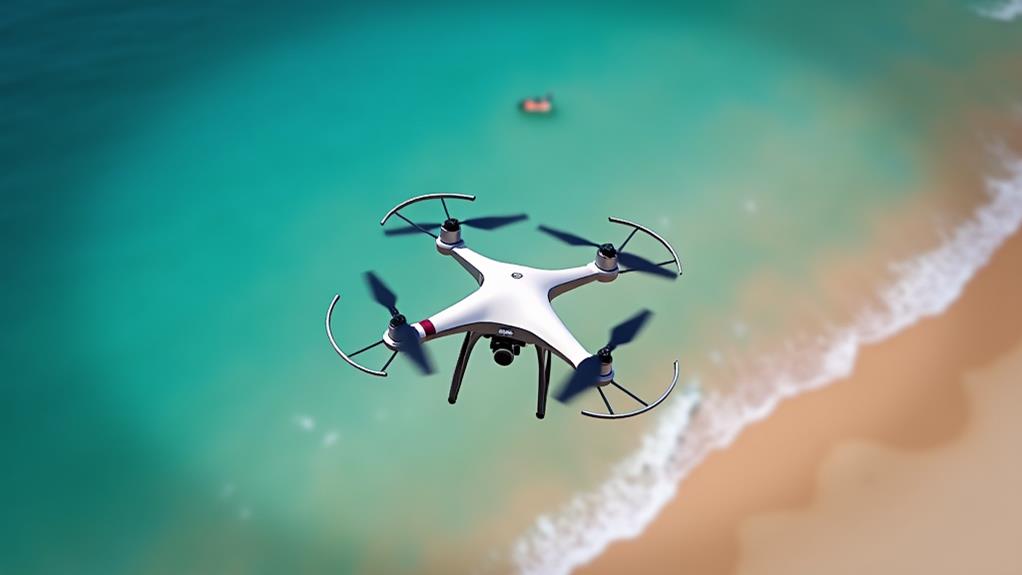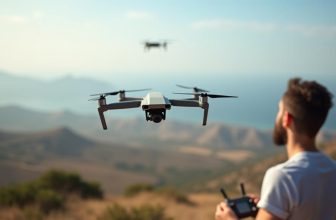
As you prepare to release your drone into the Dominican Republic's vibrant skies, remember that freedom comes with responsibility – just like a bird's wings are clipped without feathers, your drone's capabilities are limited without adherence to local laws. You're about to enter a regulatory landscape that requires careful navigation. To avoid turbulence, paramount to understand the country's drone regulations, which can make all the difference between a successful aerial adventure and a legal nightmare. So, what are the three vital drone laws you need to know to guarantee a smooth flight?
Contents
- 1 Key Takeaways
- 2 Registering Your Drone
- 3 Permitted Flight Zones
- 4 Safety and Privacy Rules
- 5 Frequently Asked Questions
- 5.1 Can I Fly My Drone Near Airports or in Restricted Airspace?
- 5.2 Do I Need a Special Permit to Fly for Commercial Purposes?
- 5.3 Can I Fly My Drone at Night or in Low-Visibility Conditions?
- 5.4 Are There Any Weight or Size Restrictions for DRones in the DR?
- 5.5 Can I Bring My Drone Into the Dominican Republic as a Tourist?
- 6 Conclusion
Key Takeaways
- Register your drone with the Dominican Republic's Civil Aviation Authority (IDAC) and obtain a valid registration certificate.
- Familiarize yourself with permitted flight zones, avoiding sensitive areas like airports, military bases, and national parks.
- Obtain prior authorization before flying over populated areas, such as cities and towns, and respect coastal boundaries.
- Maintain a safe distance from people and their property, avoiding unauthorized surveillance or filming, and obtain explicit permission when needed.
- Prioritize safety and privacy, respecting personal boundaries and avoiding actions that could be considered invasive or disruptive.
Registering Your Drone
When preparing to fly your drone in the Dominican Republic, registering your unmanned aerial vehicle (UAV) is a crucial step to guarantee compliance with local regulations.
You'll need to obtain a registration certificate from the Dominican Republic's Civil Aviation Authority (IDAC). This certificate is valid for one year and can be renewed annually.
To register, you'll need to provide documentation, including proof of ownership, a copy of your passport, and a commercial operating license (if applicable).
You may also need to obtain foreign operator permits, which can be acquired through the IDAC or an authorized representative.
Additionally, consider investing in drone insurance options to protect yourself against liability claims or equipment damage.
The registration process typically takes a few days, and you can submit your application online or through a local representative.
Verify you have all required documents and information to avoid delays.
Failure to register your drone can result in fines, penalties, or even confiscation of your UAV.
Permitted Flight Zones
Flying over the Dominican Republic's stunning landscapes and bustling cities requires careful planning, particularly when it comes to traversing permitted flight zones.
You'll need to familiarize yourself with the country's airspace restrictions to avoid any legal issues or safety risks.
Firstly, you should be aware that there are specific no-fly zones around sensitive areas like airports, military bases, and national parks.
You're also prohibited from flying over populated areas, such as cities and towns, without prior authorization.
Additionally, you must respect coastal boundaries, keeping a safe distance from the shoreline to avoid interfering with maritime activities.
It's essential to consult the Dominican Republic's official aviation authority or a reliable drone flight planning tool to verify you're aware of all the restricted areas.
By doing so, you'll be able to plan your drone flights safely and legally, capturing breathtaking footage while respecting the country's regulations.
Safety and Privacy Rules
Your drone's rotors humming above the Dominican Republic's picturesque landscape is a thrilling experience, but it's essential to prioritize safety and privacy to avoid legal repercussions and respect the local community.
As a responsible drone operator, you must guarantee you're not committing airspace violations, such as flying near airports, military bases, or national parks. These restricted areas are clearly marked on aeronautical charts and online resources.
Respecting personal boundaries is equally pivotal.
You must maintain a safe distance from people and their property, avoiding any unauthorized surveillance or filming. This includes private residences, beaches, and public gatherings. Always obtain explicit permission before capturing footage of individuals or their property.
Frequently Asked Questions
Can I Fly My Drone Near Airports or in Restricted Airspace?
You shouldn't fly your drone near airports or in restricted airspace, as Airport Proximity regulations strictly prohibit it, and Airspace Regulations dictate no-fly zones to guarantee safety; violating these rules can result in serious consequences, including fines and confiscation.
Do I Need a Special Permit to Fly for Commercial Purposes?
You'll need a special permit to fly your drone for commercial purposes, which involves obtaining a business license and securing drone insurance that covers liability and potential damages.
Can I Fly My Drone at Night or in Low-Visibility Conditions?
You shouldn't fly your drone at night or in low-visibility weather conditions, as it's hazardous and against regulations; guarantee you're aware of local weather forecasts and only operate during daylight hours with clear visibility to maintain safety and compliance.
Are There Any Weight or Size Restrictions for DRones in the DR?
Cut to the chase: when it comes to flying drones in the DR, you'll need to check the weight and size restrictions. For drones over 250 grams, you'll require Drone Registration, and be aware of Airspace Classification to avoid no-fly zones.
Can I Bring My Drone Into the Dominican Republic as a Tourist?
When traveling to the Dominican Republic as a tourist, you're allowed to bring your drone, but be aware of Customs regulations and potential Travel restrictions, ensuring you comply with all requirements to avoid any issues or penalties.
Conclusion
As you navigate the skies of the Dominican Republic, remember that drone laws are the map that guides you through the labyrinth of regulations. Registration is the key that activates your journey, permitted flight zones are the paths you must follow, and safety and privacy rules are the guardians that protect both you and others from harm. By respecting these laws, you'll guarantee a smooth and safe flight, and avoid getting lost in the wilderness of legal trouble.





